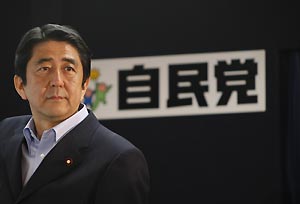Japan PM to stay despite defeat
(Reuters)Updated: 2007-07-29 22:47
TOKYO, July 29 - Japanese Prime Minister Shinzo Abe's conservative ruling camp suffered a devastating defeat in upper house elections on Sunday, but the 52-year-old conservative said he intended to stay in his post despite the drubbing.
 |
| Japanese Prime Minister Shinzo Abe makes an appearance before the media at the ruling Liberal Democratic Party headquarters in Tokyo July 29, 2007 after an upper house election. The sign reads, Liberal Democratic Party. [Reuters] |
"We need to restore the people's trust in the country and the government," a weary and drawn-looking Abe told reporters.
Voters angry after a string of government scandals and gaffes and the bungling of pension records stripped Abe's coalition of its upper house majority, Japanese media reported, in his first big electoral test since taking office 10 months ago.
Abe's coalition will not be ousted from government by a loss in the upper house, since it has a huge majority in the more powerful lower chamber, which elects the premier.
But, with the main opposition Democratic Party of Japan on track to become the biggest party in the chamber, laws will be hard to enact, threatening policy deadlock.
"We need to discuss issues closely with the Democratic Party in the upper house and listen to them when necessary," said Abe, after placing a few red rosettes marking the LDP's scarce victories on a results board at his party's headquarters.
Public broadcaster NHK said its exit polls showed that the LDP and its partner, New Komeito, would win between 39 and 55 seats -- far short of the 64 needed to keep their majority in the upper house, where half of the 242 seats were up for grabs.
OUT OF TOUCH?
Critics say Abe, who pledged to boost Japan's security profile, rewrite its pacifist constitution and nurture patriotism in schools, was out of touch with voters.
"Prime Minister Abe has projects like revising the constitution, but the Democrats have been saying that people's everyday lives should come first. I think those policies should be prioritised," said Hirofumi Nemoto, 48, a newspaper seller in Chiba, who said he voted for the Democratic Party.
Democratic Party leader Ichiro Ozawa -- a pugnacious veteran who bolted from the LDP 14 years ago -- had pledged to shrink income gaps and ensure the weak are not neglected.
It was a remarkable turnaround for for his party, which had been crushed by charismatic former LDP Prime Minister Junichiro Koizumi in a lower house election just two years ago.
"This shows the high expectations that people have for us," Democratic Party executive Yukio Hatoyama said.
"They really didn't trust the Abe cabinet and they want us to get rid of this stalemate."
Analysts said Abe would still face pressure to resign but added the party was short of viable successors.
"The people clearly gave Abe a thumbs-down. His credibility as a leader was completely rejected," said Hokkaido University professor Jiro Yamaguchi.
"The real crisis for the LDP is that there is nobody who would call for Abe's resignation and say, 'I'll do it.'"
Abe, Japan's first leader born after World War Two, won early praise for
improving ties with Beijing and Seoul that had chilled during the five-year
reign of Koizumi, his predecessor.
| 1 | 2 |  |
|
|
|
||
|
||
|
|